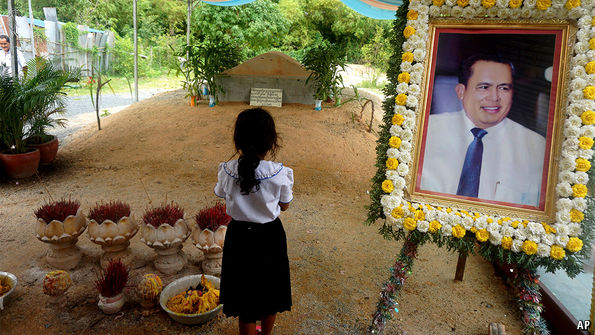
The leader of Cambodia’s opposition resigns
But the government will keep persecuting his colleagues
The Economist | 16 February 2017
AT A wedding in the southern province of Kandal, the resignation of
Sam Rainsy, the country’s longtime opposition leader, is announced in
passing by a teenager scrolling through Facebook. The apparent departure
of a figure who has been central to Cambodian politics for 20 years
created a kerfuffle among Cambodia-watchers when it emerged this week.
The wedding guests simply shrug.
The apathy reflects the
disconnect between Mr Sam Rainsy, who describes himself as the “national
and international symbol of resistance” to Cambodia’s authoritarian
government, and the country from which he has been absent since 2015 in
order to avoid arrest on various charges. As local elections approach in
June, with parliamentary elections looming a year on, this cosmopolitan
former banker campaigning from Paris was always going to struggle to
energise the provinces.
Cambodia’s strongman prime minister, Hun
Sen, had threatened a week earlier to teach Mr Sam Rainsy “a lesson”.
The courts had already convicted him in several dubious cases. Next the
ruling Cambodian People’s Party (CPP) drafted a law that would allow the
authorities to dissolve any party led by someone convicted of a crime.
Mr Sam Rainsy said he was stepping down to avoid the dissolution of his
Cambodia National Rescue Party (CNRP), the only credible opposition.
But the CPP is pressing on with its plans to amend the election law,
adding a vague clause that would allow the closure of parties that
foment “disunity” and a rule banning donations from abroad, among other
things. Both measures are aimed at the CNRP, which is fiercely critical
of the government and gets most of its funding from Cambodian
expatriates.
The hounding of the opposition is relentless. Kem Sokha, the CNRP’s
acting leader, has also been repeatedly dragged into court. Pro-CPP
websites, meanwhile, have leaked recordings of senior CNRP members’
phone calls, fuelling suspicions of state-backed wiretapping. All
critics of the government are frightened after the murder last summer of
Kem Ley, a political commentator; Mr Hun Sen fuels the fire by calling
on them by name to watch out.
But even by the grim standards of Mr
Hun Sen’s 32-year rule, his latest efforts to dismantle the opposition
mark a lurch towards autocracy. The CNRP won 55 out of the 123 seats in
the National Assembly in the most recent parliamentary election, in
2013. Its strength seems to stem not from the charisma of its leaders
but from a general discontent with the status quo. Even with Mr Sam
Rainsy out of the picture, in other words, Mr Hun Sen will keep
tormenting the opposition.


No comments:
Post a Comment